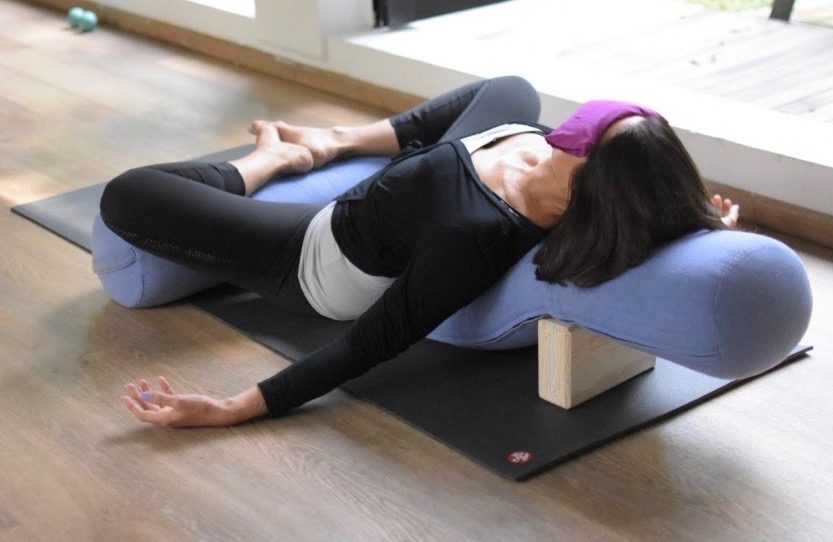In today's society, we're often short of time, stress is part of our daily lives and we find it hard to take a little break.
Have you ever wondered whether you really don't have enough time? Is the pace at which you work just a function of society and the world we live in, or could you choose to give yourself more time and make fewer concessions to your health?
Yoga is renowned for being a practice that relaxes and brings well-being, but a large proportion of yoga practices today focus on more dynamic exercises, and sessions can be very intense.
Here, we take a different approach to yoga, one in which we don't look for intense physical work on the body. Instead, we seek relaxation, and this practice is called Restorative Yoga.
What is Restorative Yoga?
Restorative yoga is a deeply relaxing style of yoga that makes sense in the search for balance and well-being. The poses are held for a long time, 10 to 15 minutes, in total comfort thanks to the props that fully support your body, for absolute physical release. In this way, you can let go and gradually release all tension, whether emotional, physical or mental. During these poses, Pranayama breathing practices are sometimes suggested.
Restorative yoga, also known as the yoga of rest and digestion, originated in the teachings of BKS Iyengar. Judith Hanson Lasater, one of the great teachers of Iyengar, has made Restorative yoga popular in the United States.
This very gentle practice is designed to help you regain your mobility and suppleness, and above all to release all your tension and relax. It brings deep relaxation and balance to both mind and body. This type of yoga is a self-care approach that helps combat chronic stress and the hurried lifestyle of modern times.
The Restorative Yoga postures are often very simple to adopt, and are practised in a slow, gentle rhythm that corresponds to that of the breath.
This particular yoga practice allows us to give ourselves time and space for ourselves, it gives the body a chance to heal and the mind time to settle through relaxation.
Who is Restorative Yoga for?
With its simple, comfortable postures, Restorative Yoga is perfect for everyone. Each and every one of us would benefit from discovering it. It is also a particularly beneficial practice for people suffering from anxiety or depression, or for those who feel stressed.
How does a Restorative Yoga session work?
The comfort and needs of the individual are met through the use of accessories (blankets, bolsters, blocks, straps, etc.) to support the body in relaxation poses. The aim is for everyone to find their own comfortable position, whatever their anatomy, medical history or feelings at the time.
In addition to these supports, Restorative Yoga also uses gravity to help relax and release tension. Minimal light, silence, warmth and soothing breathing are used to guide the muscles and mind towards tranquillity.
A Restorative Yoga session can vary depending on the teacher and the group. It often takes place in 3 stages:
1. The session begins with breathing practices in a restorative sitting or lying posture.
2. Then there is a slow transition to a series of asanas, each lasting up to 15 minutes. The posture can be combined with a breathing exercise. This allows the body and mind to relax completely.
3. The session ends with a few minutes' relaxation in Savasana position. This is the final stage in the practice, during which your body has given way to your mind, your nervous system and your muscles have relaxed.
The benefits of Restorative Yoga
Restorative Yoga has many benefits for the body and mind.
- Eliminates tension in the body and allows you to let go
- Helps to reduce and better manage stress and anxiety
- Combating insomnia and other sleep disorders
- Helps reduce negative thoughts and depression
- Develops joy and enthusiasm
- Creates better balance in the body and inner serenity
- Reduces joint and muscle pain
- Increases self-confidence
- Helps you understand yourself better
- Relieves the effects of chronic stress
- Improves digestion
Sometimes, after a few Restorative poses, Laurence will guide you through a YOGA NIDRA. Some practices are a combination of Restorative Yoga and SOUND BATH.
If you're interested in practising yoga, don't hesitate to contact us or book your session. We offer several different yoga classes: Yin Yoga, Hatha Yoga, Meditation, Myofascial Self-Massage... The benefits of yoga have long been proven, so join us and develop your inner peace.
